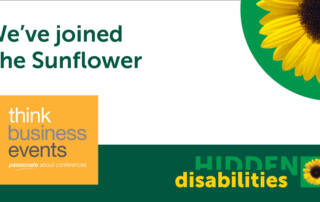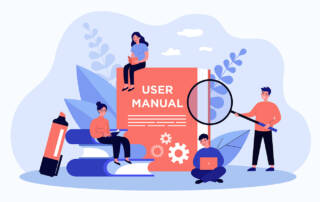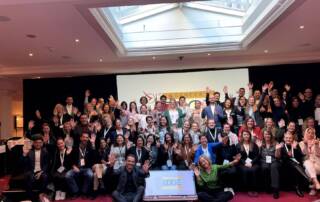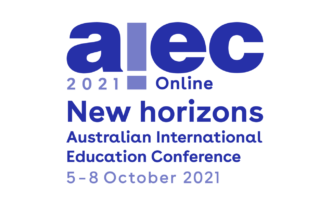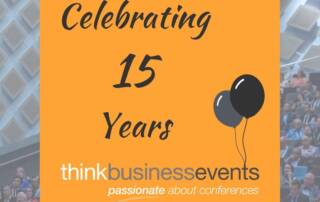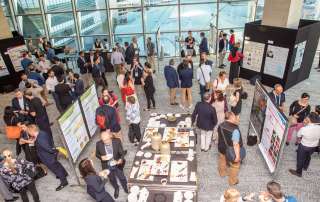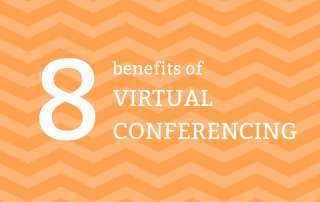6 important things to remember when planning an international conference
We’ve been lucky enough to manage a number overseas conferences in the past, most recently the World Federation of Occupational Therapists Congress in Paris. Here we consider all the do and don’ts of planning an international conference.
Working alongside a local PCO
Working with a local PCO or event manager is imperative to the success of your international conference. Using their expertise, guidance and knowledge of the area, venue, local volunteers and staff, and native language will assist in supporting the abovementioned challenges that are included in the task of executing a F2F event overseas.
Like working with any new client or organisation there are bound to be idiosyncrasies and differences in ways of working and this can be even more apparent with people from another country or culture. Having the local PCO on board can help guide you through this, for example in the USA coffee is ordered by the gallon not per head so you need to calculate how many gallons the average delegate drinks or you may end up with more than you bargained for!
Language barriers
We are very lucky here in Australia that English is the predominate second language spoken around the world. This doesn’t mean you can go it alone when creating documents, marketing collateral and general event information. It is imperative you use a reputable supplier in translations for more advanced document interpretation and website creation and copywriting.
Working with a local PCO for minor translations is helpful and having one (or many) native speakers on side will not only help with more minor translations but also things like colloquialisms of the destination language.
Include a cheat sheet as part of the pre-conference information so your delegates have some common phrases like ‘Hello’, ‘Please’ and ‘Thank-you’ to use when they arrive in the host city. “I’m sorry, I don’t speak ….., do you speak …..” is a particularly handy line to have up your sleeve as locals will appreciate your considerate approach to conversation.
For all on-site signage and collateral you must engage with a professional translator service to make sure all information, in all languages, is clear, concise and correct!

Image © Christophe Peus
Government regulations
This might be one of the most complex elements of managing an international conference. Government documentation and regulations can be confusing at the best of times so dealing with a whole set of guidelines and things such as VAT/tax obligations can be difficult. This connects back to the aforementioned importance of having a local PCO on side as well as a good working relationship with your venue who may be able to assist you with such procedural issues.
Time zones
Although conference management always includes working outside the regular 9-5 workday, working with people in international time zones doesn’t just mean scheduling meetings after dinner or very early in the morning. An understanding should be made early on around deadlines and feedback, and what the general expectations are in the working relationship between PCO, planning committee, scientific committee, and suppliers.
Leveraging the host city
Half the fun of any conference, but particularly an international event, is the opportunity to explore a new city or country. Supplying city guides to your delegates is such a great way to improve engagement and build the anticipation of the event itself. Doing proper research around restaurants, hotels, museums and other activities will go a long way to creating a memorable experience for your speakers and delegates that live long after the conference is over.
Public health and risk management
Although general public health measures were always something to consider in travelling overseas, for example it was already recommended to receive vaccinations for certain countries for things like Yellow Fever and Hepatitis A. But with the COVID-19 pandemic shaking all aspects of travel and large gatherings it is now more important than ever to take federal state laws and regulations into account, and most importantly make sure your delegates and other stakeholders are aware of these and any potential risks
Got questions? Contact us for more information and to discuss your upcoming event.

Image © Christophe Peus
Read More of Our Event Thoughts
- Think Business Events Partners with Hidden Disabilities Sunflower to Enhance Accessibility at EventsKim Stevenson2024-11-25T15:30:49+11:00
Think Business Events Partners with Hidden Disabilities Sunflower to Enhance Accessibility at Events
- How To Prepare When Attending Your First ConferenceKim Stevenson2023-03-20T16:07:18+11:00
How To Prepare When Attending Your First Conference
- Kim’s trip to Geneva and the IAPCO EDGE SeminarKim Stevenson2023-01-27T15:19:43+11:00
Kim’s trip to Geneva and the IAPCO EDGE Seminar
- We asked some of our team ‘What’s in your conference kit?’Kim Stevenson2022-11-21T14:46:55+11:00
We asked some of our team ‘What’s in your conference kit?’
- 6 important things to remember when organising an international conferenceKim Stevenson2022-09-30T16:51:56+10:00
6 important things to remember when organising an international conference
- Case Study: The Australian Defence Science, Technology & Research SummitKim Stevenson2022-10-10T10:47:15+11:00
Case Study: The Australian Defence Science, Technology & Research Summit
- Case Study: The Australasian College of DermatologistsKim Stevenson2022-06-09T11:55:32+10:00
Case Study: The Australasian College of Dermatologists
- Case Study: Royal Australian and New Zealand College of OphthalmologistsKim Stevenson2022-04-07T17:11:31+10:00
Case Study: Royal Australian and New Zealand College of Ophthalmologists
- Case Study: Australian International Education Conference 2021Kim Stevenson2022-02-03T13:17:15+11:00
Case Study: Australian International Education Conference 2021
- 18 months of virtual and hybrid conferencing – these are our top 5 takeawaysKim Stevenson2022-09-27T12:46:37+10:00
18 months of virtual and hybrid conferencing – these are our top 5 takeaways
- Returning to face-to-face events 2.0admin2022-09-27T12:45:07+10:00
Returning to face-to-face events 2.0
- Case Study: Australasian Diabetes Congress 2021Kim Stevenson2022-09-27T12:44:30+10:00
Case Study: Australasian Diabetes Congress 2021
- Celebrating 15 years of Think Business Eventsadmin2021-09-22T14:50:01+10:00
Celebrating 15 years of Think Business Events
- Case Study: Dietitians Australia 2021Kim Stevenson2022-09-27T12:43:44+10:00
Case Study: Dietitians Australia 2021
- Exploring the new world of hybrid eventsKim Stevenson2022-09-27T12:42:53+10:00
Exploring the new world of hybrid events
- Returning to face-to-face eventsKim Stevenson2020-09-02T11:55:48+10:00
Returning to face-to-face events
- Our favourite virtual sponsorship opportunitiesadmin2022-09-27T12:35:50+10:00
Our favourite virtual sponsorship opportunities
- What’s the difference between a webinar and a virtual conference?admin2022-09-27T12:33:27+10:00
What’s the difference between a webinar and a virtual conference?
- Five Stages of the Conference Marketing Cycleadmin2022-09-27T12:27:59+10:00
Five Stages of the Conference Marketing Cycle
- Working from home: Staying productive and connectedadmin2020-04-06T17:26:27+10:00
Working from home: Staying productive and connected


